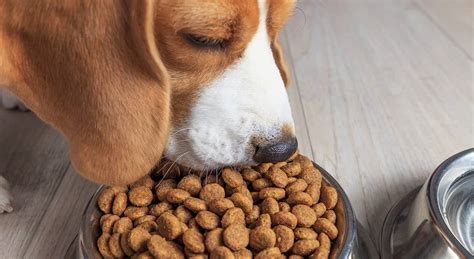Understanding Your Pup’s Nutritional Needs
Dogs are not just our pets, they are members of our family. And just like us, they have specific nutritional needs that must be met in order to maintain their health and well-being. Understanding and meeting your pup’s nutritional needs is essential for their overall health and longevity.
One of the first factors to consider when it comes to your pup’s nutritional needs is their age. Different age groups have different requirements when it comes to nutrients and calories. Puppies, for example, require a diet that is high in protein and fat to support their growing bodies and provide them with the energy they need to play and learn. Adult dogs, on the other hand, have different needs and require a balanced diet that provides all the essential nutrients they need to maintain a healthy weight and support their daily activities.
The size of your dog also plays a role in their nutritional needs. Small breed dogs have faster metabolisms and may require a diet that is higher in calories to meet their energy requirements. On the other hand, large and giant breed dogs may have a slower metabolism and require a diet that is lower in calories to prevent weight gain and reduce the risk of joint problems.
Another important factor to consider is any special considerations your pup may have. If your dog has any food allergies or sensitivities, it is important to choose a dog food that is free from the ingredients that trigger their allergies. Additionally, senior dogs may require a diet that is specially formulated to support their aging bodies and promote joint health.
It is important to consult with your veterinarian to determine the specific nutritional needs of your pup. They can provide you with guidance on choosing the right dog food and recommend any necessary supplements to ensure your pup is getting all the nutrients they need to thrive. By understanding and meeting your pup’s nutritional needs, you are taking an important step in ensuring their overall health and well-being.
Factors to Consider When Choosing Dog Food
When it comes to choosing the right dog food for your pup, there are several important factors to consider. The food you select will play a significant role in your dog’s overall health and well-being. It is crucial to understand your dog’s nutritional needs and make informed decisions to ensure they receive a balanced diet.
1. Age: One of the primary factors to consider when choosing dog food is your pup’s age. Just like humans, dogs have different nutritional requirements at different stages of life. Puppies have higher energy needs and require a diet that supports their growth and development. Adult dogs need a well-balanced diet to maintain their overall health. Senior dogs, on the other hand, may have specific dietary needs to support their aging bodies.
2. Size: The size of your dog is another important consideration. Small breed dogs have higher metabolic rates and may require higher calorie intake compared to larger breeds. Additionally, their small mouths may require smaller kibble sizes. Medium breed dogs fall in between and may have their own unique requirements. Large and giant breed dogs have different growth patterns and require specific nutritional support to prevent developmental issues.
3. Health Concerns: If your dog has specific health concerns, it is crucial to choose a dog food that addresses these issues. Some dogs may have allergies or sensitivities to certain ingredients, while others may have specific dietary restrictions due to medical conditions. Consult with your veterinarian to understand any special dietary needs your dog may have and choose a dog food accordingly.
- Consider your dog’s age when selecting food
- Take into account the size of your dog
- Address any health concerns your dog may have
| Age | Recommended Dog Food |
|---|---|
| Puppies | High-quality puppy food formulated for growth |
| Adults | Well-balanced adult dog food |
| Seniors | Senior dog food with additional joint support |
Remember to always read the labels and ingredients list of the dog food you choose. Look for high-quality protein sources, essential vitamins and minerals, and avoid fillers or artificial additives. It is also important to gradually transition your dog to a new food to minimize any digestive upset. By considering these factors and making informed choices, you can ensure that your furry friend receives the nutrition they need to live a healthy and happy life.
Matching Dog Food to Your Pup’s Age
When it comes to matching dog food to your pup’s age, it’s important to understand that different life stages require different nutritional needs. Just like human babies, puppies have unique dietary requirements to support their growth and development. On the other hand, adult dogs have different needs to maintain optimal health and energy levels. And as dogs start to enter their senior years, their nutritional needs change once again. In this blog post, we will discuss the importance of age-appropriate dog food and provide some essential tips for selecting the right food for your furry friend.
First and foremost, puppies require a diet that is specially formulated to support their rapid growth and development. These young pups need higher levels of protein, fat, and essential nutrients to support their growing muscles and bones. Look for dog food that is labeled as “puppy” or “growth formula” to ensure it meets their specific needs. Additionally, feeding your puppy smaller, frequent meals throughout the day is beneficial for their digestion and helps to maintain stable blood sugar levels.
As your pup grows into an adult dog, their nutritional needs will change. Adult dogs generally require a balanced diet that provides the necessary nutrients for maintenance and overall well-being. Look for dog food labeled as “adult” or “maintenance” to ensure it meets these requirements. It’s also important to consider your dog’s activity level and any specific health concerns they may have when selecting their food. For example, active dogs may benefit from a higher protein diet, while dogs with certain health conditions may require a specialized diet prescribed by their veterinarian.
Finding the Right Dog Food for Small Breeds
When it comes to finding the right dog food for small breeds, there are several important factors to consider. Small breed dogs have unique nutritional needs that differ from larger breeds, and their diet plays a crucial role in their overall health and well-being. By understanding these specific requirements and considering certain factors, you can ensure that you are providing your tiny companion with a diet that meets their needs and keeps them healthy and happy.
One of the key factors to consider when choosing dog food for small breeds is their size and metabolism. Small breed dogs have faster metabolisms compared to larger breeds, which means they require food that is higher in calories to meet their energy needs. It is essential to select a dog food that is specifically formulated for small breeds and provides the appropriate calorie content to support their active lifestyle.
Another important consideration is the size and texture of the kibble. Small breed dogs typically have smaller mouths and jaws, making it difficult for them to chew and digest larger kibble. It is recommended to choose dog food that has smaller kibble size, making it easier for your furry friend to eat and digest. Additionally, opting for dog food with a softer texture can also be beneficial, as it is gentler on their teeth and gums.
Lastly, it is crucial to read and understand the ingredients list when selecting dog food for small breeds. Look for high-quality protein sources, such as chicken or fish, as the primary ingredients. Avoid dog food with fillers and artificial additives, as these can be hard for small dogs to digest and may lead to allergies or digestive issues. It is also recommended to choose dog food that includes essential nutrients, such as omega-3 fatty acids and antioxidants, which contribute to overall health and immune system support.
- Consider the size and metabolism of your small breed dog when selecting dog food.
- Choose dog food with smaller kibble size and a softer texture for easier digestion.
- Read and understand the ingredients list, and opt for high-quality protein sources and essential nutrients.
| Benefits of Finding the Right Dog Food for Small Breeds |
|---|
| 1. Optimal health and well-being: Providing your small breed dog with the right dog food ensures they receive the necessary nutrients to support their overall health and well-being. |
| 2. Improved digestion: Choosing dog food with smaller kibble size and a softer texture can help prevent digestive issues and promote better digestion in small breed dogs. |
| 3. Enhanced energy levels: Small breed dogs have faster metabolisms, and the right dog food with higher calorie content can provide them with the energy they need for their active lifestyle. |
| 4. Support for the immune system: Dog food that includes essential nutrients such as omega-3 fatty acids and antioxidants can help strengthen the immune system of small breed dogs. |
| 5. Better oral health: Opting for smaller kibble size and softer texture can contribute to improved dental health in small breed dogs, as it is easier for them to chew and reduces the risk of dental issues. |
Choosing the Best Dog Food for Medium Breeds
When it comes to taking care of our furry friends, nutrition is key! Providing the right diet for our dogs is vital to their overall health and well-being. Medium breed dogs, such as Beagles, Bulldogs, and Cocker Spaniels, have specific nutritional needs that need to be met in order to keep them healthy and happy. In this blog post, we will explore the factors to consider when choosing the best dog food for medium breeds.
Factors to Consider
When selecting a dog food for medium breeds, it is important to consider the following factors:
- Protein Content: Medium breed dogs require a sufficient amount of protein to support their active lifestyle and maintain muscle mass. Look for dog foods that have high-quality sources of animal protein, such as chicken, turkey, or fish.
- Adequate Fats: Fats are a concentrated source of energy and provide essential fatty acids for your dog’s coat and skin health. Medium breed dogs can benefit from a moderate amount of healthy fats in their diet. Look for dog foods that contain sources of omega-3 and omega-6 fatty acids.
- Appropriate Caloric Intake: Medium breed dogs have different caloric needs compared to larger or smaller breeds. It is important to feed them an appropriate amount of calories to help them maintain a healthy weight. Consult with your veterinarian to determine the ideal caloric intake for your dog.
The Importance of a Balanced Diet
Ensuring that your medium breed dog receives a balanced diet is crucial. A balanced diet should include the right combination of protein, fats, carbohydrates, vitamins, and minerals. Proper nutrition can help prevent common health issues such as obesity, allergies, and digestive problems. When selecting a dog food, look for products that are labeled as “complete and balanced” to ensure that all of your dog’s nutritional needs are being met.
Special Considerations
Some medium breed dogs may have specific dietary needs or sensitivities. If your dog has any food allergies or intolerances, it is important to choose a dog food that is tailored to their specific needs. Additionally, if your dog has any existing health conditions, such as joint problems or a sensitive stomach, there are specialized dog foods available that can help manage these issues.
In Conclusion
Choosing the best dog food for medium breeds involves understanding their specific nutritional needs and selecting a high-quality, balanced diet that suits their individual requirements. Remember to consider factors such as protein content, fats, and appropriate caloric intake. By providing the right nutrition for your medium breed dog, you can help ensure a long and healthy life for them.
Selecting Dog Food for Large and Giant Breeds
When it comes to selecting dog food for large and giant breeds, there are several factors to consider to ensure your furry friend receives the proper nutrition they need. These breeds have different nutritional requirements compared to smaller dogs, mainly due to their size and growth rate. It’s essential to choose a dog food that supports their bone and joint health, promotes a healthy weight, and prevents any potential health issues associated with their size.
The first factor to consider is the protein content in the dog food. Large and giant breeds require a higher protein intake to support their muscle development as well as the growth and repair of their tissues. Look for dog food that has high-quality animal-based proteins listed as the primary ingredients, such as chicken, beef, or fish. Avoid dog foods with excessive fillers and by-products, as these may not provide the essential amino acids needed for your dog’s overall health.
Next, consider the calcium and phosphorus levels in the dog food. These minerals are crucial for promoting healthy bone and teeth development in large and giant breeds. However, it’s essential to strike a balance, as excessive calcium intake can lead to skeletal abnormalities and joint issues. Look for dog food that provides a controlled amount of calcium and phosphorus to support proper growth without overloading your dog’s system.
In addition to protein and minerals, large and giant breeds benefit from dog food that contains glucosamine and chondroitin. These additives promote joint health and can help prevent common issues such as hip dysplasia and arthritis, which are more prevalent in larger dogs. Look for dog food specifically formulated for large and giant breeds that include these joint-supporting ingredients.
Special Considerations for Senior Dogs
As our dogs age, their nutritional needs change, requiring special considerations to ensure their health and well-being. Just like humans, senior dogs may experience a decline in energy, metabolism, and digestion. Therefore, it is important to provide them with a balanced diet that addresses their specific needs. In this blog post, we will discuss the factors to consider when selecting dog food for senior dogs.
First and foremost, senior dogs may have difficulty chewing or swallowing, so it is important to choose dog food that is easy for them to eat. Soft or moist food can be more palatable for older dogs with dental issues or missing teeth, while smaller kibble sizes are easier for them to handle. Additionally, adding warm water to dry kibble can help soften it, making it easier for senior dogs to consume.
Secondly, senior dogs are more prone to certain health issues such as joint problems, obesity, and dental disease. Therefore, their diet should focus on promoting joint health, weight management, and dental hygiene. Look for dog food that contains glucosamine and chondroitin, which support joint health and mobility. Additionally, a controlled calorie and fat content can help senior dogs maintain a healthy weight, reducing the risk of obesity-related issues. Lastly, dental treats or food specially designed to promote dental health can help senior dogs maintain good oral hygiene.
- Joint health: Look for dog food containing glucosamine and chondroitin.
- Weight management: Choose dog food with controlled calorie and fat content.
- Dental hygiene: Consider dental treats or food that promotes oral health.
| Age | Food Type | Feeding Frequency |
|---|---|---|
| 7-9 years | Adult or senior dog food | Twice a day |
| 10+ years | Senior dog food or specialized diet | Two to three times a day |
Lastly, it is essential to adjust the feeding frequency and portion sizes for senior dogs. As they age, their metabolism slows down, and they may become less active. Therefore, feeding them smaller, more frequent meals can help prevent overeating and digestive issues. Consulting with your veterinarian is crucial to determine the appropriate feeding schedule and portion sizes for your senior dog.
In conclusion, special considerations must be taken into account when selecting dog food for senior dogs. The texture, ingredients, and nutritional content should align with their specific needs. Providing them with a balanced diet that promotes joint health, weight management, and dental hygiene will contribute to their overall well-being and quality of life in their golden years.
Frequently Asked Questions
What are the nutritional needs of my puppy?
Puppies need a balanced diet that includes a proper mix of protein, carbohydrates, fats, vitamins, and minerals to support their growth and development.
What factors should I consider when choosing dog food?
When choosing dog food, you should consider factors such as your dog’s age, size, breed, activity level, and any specific dietary needs or allergies they may have.
How can I match my dog’s food to its age?
For puppies, you should choose puppy food that is specially formulated to meet their growing needs. Adult dogs can be fed a maintenance diet, while senior dogs may benefit from a diet that addresses their specific age-related issues.
What should I look for when selecting dog food for small breeds?
When selecting dog food for small breeds, look for recipes that provide adequate energy levels and small kibble size for easy chewing. It should also contain essential nutrients to support their high metabolism.
How do I choose the best dog food for medium breeds?
For medium breeds, choose dog food that offers a balance of nutrients and energy levels suitable for their size and activity level. Look for recipes that include high-quality protein sources and essential fatty acids.
What should I consider when selecting dog food for large and giant breeds?
Large and giant breeds have specific nutritional needs, such as controlled calcium and phosphorus levels to support healthy bone growth. Look for dog food specifically formulated for their size, with added joint support ingredients.
Are there any special considerations for senior dogs’ food?
Senior dogs may benefit from a diet that is lower in calories to prevent weight gain, but still provides adequate nutrition for their aging bodies. Look for dog food with added antioxidants and joint support ingredients to promote overall health and mobility in older dogs.





